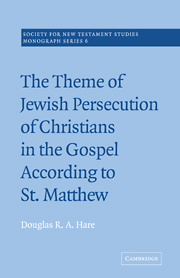Book contents
- Frontmatter
- Contents
- Preface
- List of abbreviations
- I General Remarks on the Nature of the Conflict between Jews and Christians
- II Survey of the Data of Jewish Persecution of Christians in Sources other than Matthew
- III References to Jewish Persecution of Christians in the Gospel according to St Matthew
- IV Matthew's Understanding of the Causes of Persecution
- V The Christian Response to Persecution by the Jews as Evidenced by Matthew
- VI Summary and Conclusions
- Appendices
- I Use of the term ἄθεος
- II The Roman church in the first century
- III A Common Vorlage for Matt. 5: 12c and Luke 6: 23c?
- IV Two types of suffering
- V Interpreting Matthew 24
- Bibliography
- Indices
III - A Common Vorlage for Matt. 5: 12c and Luke 6: 23c?
Published online by Cambridge University Press: 25 February 2010
- Frontmatter
- Contents
- Preface
- List of abbreviations
- I General Remarks on the Nature of the Conflict between Jews and Christians
- II Survey of the Data of Jewish Persecution of Christians in Sources other than Matthew
- III References to Jewish Persecution of Christians in the Gospel according to St Matthew
- IV Matthew's Understanding of the Causes of Persecution
- V The Christian Response to Persecution by the Jews as Evidenced by Matthew
- VI Summary and Conclusions
- Appendices
- I Use of the term ἄθεος
- II The Roman church in the first century
- III A Common Vorlage for Matt. 5: 12c and Luke 6: 23c?
- IV Two types of suffering
- V Interpreting Matthew 24
- Bibliography
- Indices
Summary
In his Evangelium Lucae, Wellhausen translates the Matthean τoú ρó úμv and the Lucan oι ατρ as ‘your ancestors’ and ‘their ancestors’ respectively, but offers no justification for these renderings. E. Lohmeyer, Das Evangelium des Matthäus, second edition edited by W. Schmauch (1958), p. 96, accepts Wellhausen's conjecture (Lohmeyer's transliteration is inaccurate). Black, p. 275, likewise follows Wellhausen, but omits the prefixed Γ. Although the Γ would be required in the Vorlage of Matthew's version (cf. Dan. 7 : 7; Black's omission of the Γ here is inexplicable), Wellhausen's is impossible as the subject of the clause in Luke's Vorlage; G. Dalman, Grammatik desjüdisch-palästinischen Aramäisch, second edition (Leipzig: J. C. Heinrichs'sche Buchhandlung, 1905), p. 117, cites examples in which Γ is used determinatively, but gives no instance in which Γ with a substantive functions as the subject of a clause without any antecedent. Black, omitting the Γ, apparently takes as the adjective with 3 m. pi. suffix; cf. M. Jastrow, A Dictionary of the Targumim, the Talmud Babli and Yerushalmi, and the Midrashic Literature (New York/Berlin, Verlag Choreb, and London: Shapiro, Vallentine and Company, 1926), p. 1317. This could be translated ‘their ancestors’, or, in Greek, oι ατρσ αúτv. Although it is very unusual for the subject to follow the object in Semitic syntax, it is not impossible for the Lucan Vorlage proposed by Black to be taken in this way.
- Type
- Chapter
- Information
- Publisher: Cambridge University PressPrint publication year: 1967



